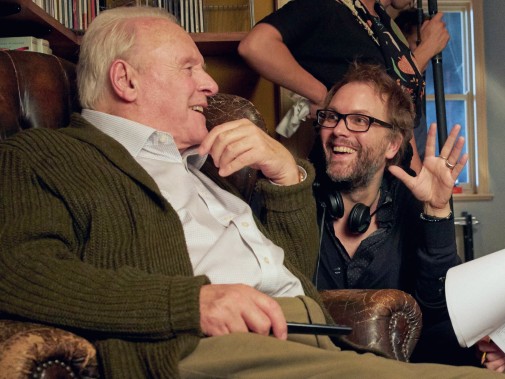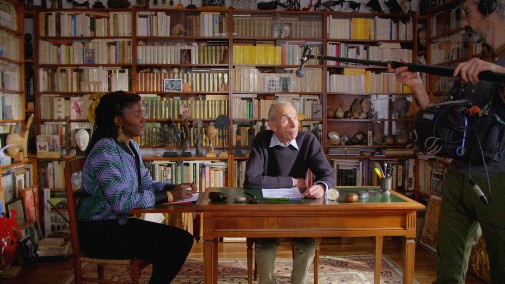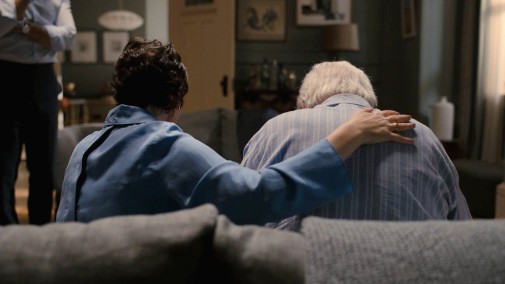
Before either film had been screened to the public or press, there was already buzz surrounding Alice Diop and Florian Zeller's newest films. Many called Saint-Omer, Diop's first narrative feature after many documentaries, a likely contender for the Golden Lion. Lo and behold, the picture has receiving glowing reviews, which is unsurprising. In contrast, this eighth day of competition at the Lido saw a shocking development with Florian Zeller's follow-up to The Father. Defying expectations The Son has received mixed reviews, some of which lambast it unsparingly. Not even the cast is above reproach to the naysayers. Even so, Hugh Jackman remains mostly unscathed, keeping those Best Actor dreams alive. Let's not forget that Zeller directed Anthony Hopkins to his second Academy Award. So let's take a look back at The Father and Alice Diop's last documentary before Saint-Omer…

WE (2021)
"Who are We? What is the meaning of We?" – such questions reverberate through Alice Diop's rigorous documentary.
The project grew into being after the terrorist attacks that shocked Paris in 2015. That event signaled a new state of awareness about the fragmentation, the fracturing, of French society. For the director, it provoked a sense of recognition regarding the attackers, descendants of postcolonial immigration, just like Diop. Moreover, these sad happenings illuminated a central mystery of French identity, of a society made of people of such different backgrounds, horizons, that an idea of "we," of unity, becomes untenable. The documentary called We, or Nous, doesn't present an answer, nor does it wish to do so.
Instead, it's a series of open interrogations structured around a geographic line and abstract notion of national self. Diop and her camera travel along the RER B, a commuter train that ties Paris' center with its outskirts, shuttling between Mitry-Mory and Saint-Rémy de Provence. This odyssey always keeps the Parisian iconography conspicuously off-screen, preferring to regard the suburban areas in a series of socioeconomic intervals. The film starts and ends with hunting, a perpetuated tradition by which wealthy white families keep a palpable connection with their ancestors, their history. Diop doesn't judge this nostalgia, simply examines and contrasts. Indeed, this documentary is a study of contrasts, both demographic and cinematic.
On the one hand, we might observe the remnants of absolute monarchy living on through institutional forces. Conversely, immigrant stories are wracked with disconnected heritage, histories lost between countries and cultures. Transcending such direct social study, Diop appeals to an ever-changing lens through which to explore her preferred themes. Sometimes, this manifests as detours into museums where video installations give voice to the last letters of Holocaust victims, missives dropped from train windows on the way to the camps. Sometimes, it's straightforward people-watching fading into home video memory from the director's personal archive.
The result is a multifaceted project, bursting at the seams with ideas and ambition, an open-ended question whose answer is always out of reach, whose conclusion shall remain stubbornly inconclusive.
We is streaming on MUBI. Alternatively, you can also rent it on Amazon Video.

THE FATHER (2020)
Part of me just wants to redirect you to one of my favorite pieces from those I've written for The Film Experience in the past few years. Meditating on the death of my last living grandparent, I tried to explain why and how Olivia Colman broke my heart in The Father. Part of me is also still recovering from the film itself as if it was an old bruise that's still healing and will sting if prodded. Maybe sting is not the word, though, and bruise might be wrong too. Perhaps it's more like a migraine – I'm familiar with those – coming and going without warning, an ever-present chronic threat. Sometimes it's a strident scream of suffering that can last days on end, sometimes a whisper that fades as soon as it appears.
In other cruder words, The Father really fucked me up. It did so by capturing an exceedingly complicated issue with equal amounts of authentic detail and aching specificity, honing on the idiosyncrasies of losing one to dementia while also exploring what it might feel like to be the one being lost. The writing balances those two perspectives though it never ostensibly aligns itself with that of Colman's character, adapting the acclaimed stage play into cinematic terms. Acting-wise, it's sheer perfection, even beyond the father-daughter duet. Precisely because of such qualities, I'm a bit dumbfounded at The Son's early negative reviews – can Zeller have lost sight of all that made The Father what it is?
One element I thought likely to be lost from one project to another was the formal inventiveness to which the first text is better suited. When first encountering The Father, I feared a stake and stagey piece of Oscar bait, valuable based on its cast and little else. What I experienced, instead, was an attempt at articulating the play's ideas through mechanisms only possible on screen. Though matters of score and cinematography left something to be desired, Yorgos Lamprinos' editing is a feat of dramaturgical precision, sharp as a scalpel and just as merciless. Time and space became the filmmaker's playthings, extensions of crumbling lucidity, the bricks by which Zeller constructs a mind prison whose apparent mundanity is but an illusion.
At its most harrowing, The Father is a horror movie hiding beneath the façade of middlebrow prestige. It’s a nightmare of domestic surrealism that's all the more horrifying for how real it feels.
The Father is streaming on Starz and DirecTV. You can also rent it on most services.
Now that we're coming to the last days of official screenings, do you have any Golden Lion predictions? Any wishes?